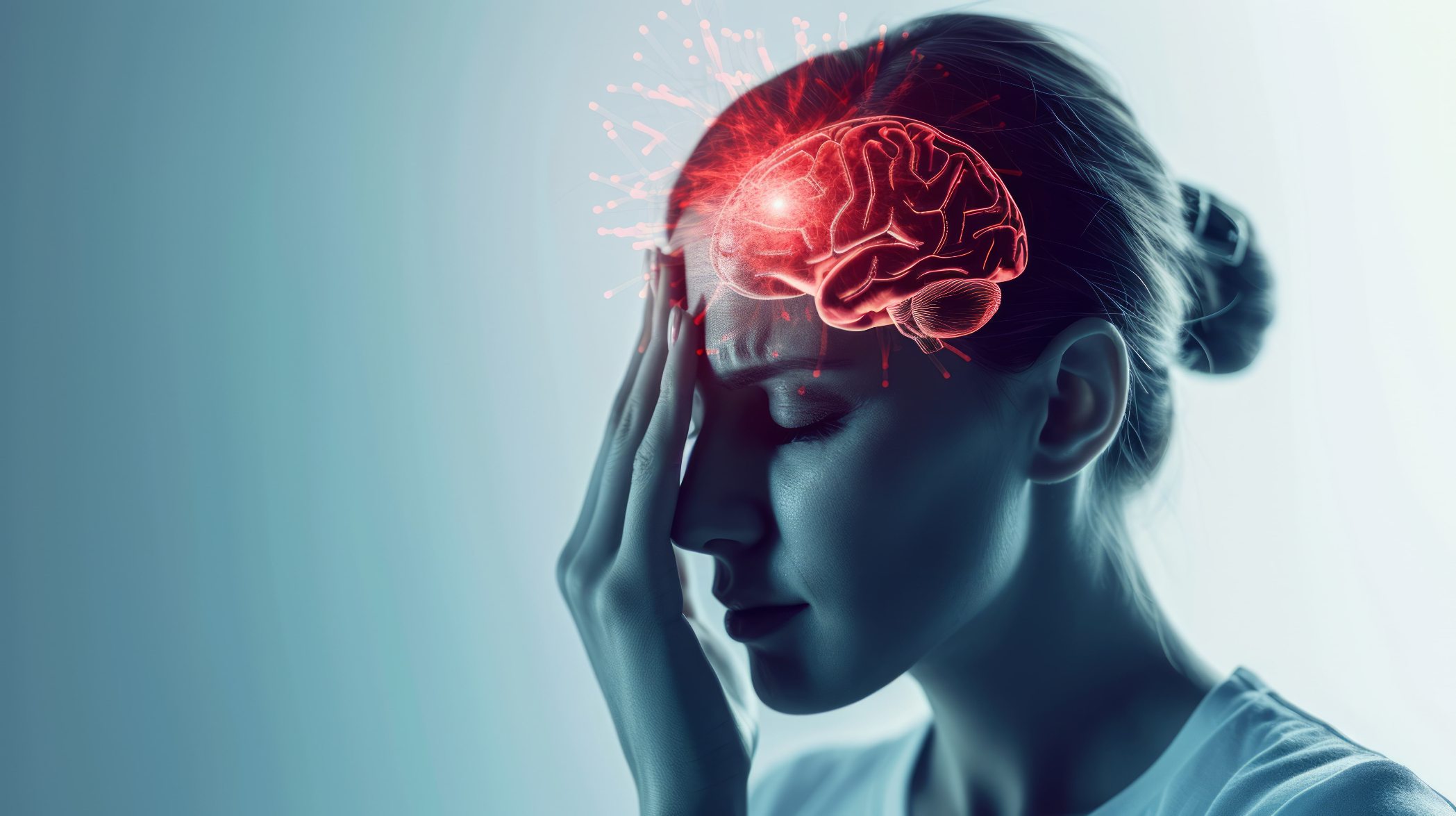How Does Trauma Affect the Brain’s Perception of Threat?
When you experience trauma, your brain’s perception of threat can be altered. The amygdala, a part of the brain responsible for processing emotions, can become hyperactive and trigger the “fight or flight” response even in non-threatening situations. This can lead to post-traumatic stress disorder (PTSD), a condition where you may experience intense fear, rage, or danger perception triggered by certain stimuli.
Learn more about our trauma treatment programs designed to restore nervous system regulation. We integrate neurofeedback therapy to support nervous system balance and reduce reactivity tied to trauma responses—helping the brain shift out of chronic “survival mode.”

During a traumatic experience, the brain stem takes control and shifts the body into survival mode. This is known as the “freeze response,” where all non-essential body and mind processes are shut down. The sympathetic nervous system increases stress hormones and prepares the body to fight, flee or freeze. This response is crucial for survival during a traumatic event, but it can also lead to long-term effects on the nervous system and autonomic body processes.
Traumatic brain injury (TBI) can also impact the brain’s ability to regulate emotions, leading to mood swings, irritability, and anxiety. The brain’s plasticity allows it to rewire itself and recover from injury, but it requires intentional effort and therapy to do so. Neuroplasticity is also crucial to rewiring the brain after trauma.
Trauma can rewire how your brain functions—but with the right support, healing is possible. At Sabino Recovery, we use neuroscience-backed therapies like EMDR, neurofeedback, and trauma-informed care to help the brain rebuild and restore.
Verify your insurance or contact us today to begin personalized healing.
Take the first step toward healing. Contact Sabino Recovery today to experience compassionate, trauma-informed care in a supportive environment.
How Does Trauma Affect Different Brain Regions?
Trauma can have a significant impact on the brain’s structure and function. Different regions of the brain are affected in different ways, resulting in a wide range of symptoms and behaviors. Here are some of the brain regions that are commonly affected by trauma:
Amygdala
The amygdala is a small almond-shaped structure in the brain that is responsible for processing emotions such as fear and anxiety. Trauma can cause the amygdala to become overactive, leading to heightened emotional responses and an increased risk of developing anxiety disorders.
Hippocampus
The hippocampus is a region of the brain that is involved in memory formation and retrieval. Trauma can cause the hippocampus to shrink in size, which can lead to memory problems and difficulty learning new information. These memory-related changes often contribute to anxiety and disorientation. Our residential trauma treatment helps reestablish cognitive and emotional balance through guided therapeutic reprocessing.
Prefrontal Cortex (PFC)
The prefrontal cortex is the part of the brain that is responsible for executive functions such as decision-making, planning, and impulse control. Trauma can damage the PFC, leading to difficulties with these functions and an increased risk of developing PTSD.
Reptilian Brain
The reptilian brain is the oldest part of the brain, responsible for basic survival functions such as breathing and heart rate. Trauma can cause the reptilian brain to become overactive, leading to symptoms such as hypervigilance and an increased startle response.
Nervous System
Trauma can also affect the nervous system, leading to a state of hyperarousal and increased sensitivity to stress. This can result in symptoms such as insomnia, irritability, and difficulty concentrating.
How Does Neuroplasticity Help with Trauma Recovery?
Neuroplasticity is the brain’s ability to change and adapt in response to experiences. This means that when someone experiences trauma, their brain can rewire itself to cope with the trauma. The brain can also heal itself through neuroplasticity, which is why therapies like Eye Movement Desensitization and Reprocessing (EMDR) therapy show promising results in treating PTSD.

In terms of trauma recovery, neuroplasticity helps the brain form new neural pathways that can bypass damaged areas. This rewiring can help individuals regain lost abilities and develop new coping mechanisms. Neuroplasticity also plays a role in rehabilitation after brain injury, as the brain can reorganize itself to resume regular functions like speaking and controlling limb movements.
The process of neuroplasticity involves the formation and strengthening of connections between neurons, which can be influenced by various factors such as exercise, learning, and therapy. By engaging in activities that promote neuroplasticity, individuals can enhance their brain’s ability to recover from trauma.
How does Trauma Affect Your Emotions and Cognition?
Trauma can have a profound impact on your emotions and cognition. It can affect your memory, anxiety, depression, reasoning, language, problem-solving, focus, attention, vigilance, awareness, cognitive processing, reading comprehension, concentration, planning, and decision-making.
When you experience a traumatic event, your brain may go into a state of shock, which can lead to a range of emotional and cognitive effects. You may feel overwhelmed, anxious, or depressed, and you may have trouble focusing or making decisions. Trauma can also affect your memory, making it difficult to recall details of the event or other important information.
In some cases, trauma can lead to the development of post-traumatic stress disorder (PTSD), which can cause persistent feelings of anxiety, fear, and avoidance. PTSD can also affect your ability to function in daily life, making it difficult to work, socialize, or engage in other activities.
Fortunately, there are ways to rewire your brain after trauma and improve your emotional and cognitive functioning. With the help of a trained therapist or counselor, you can learn techniques to manage your emotions, reduce anxiety and depression, and improve your focus and concentration. Cognitive-behavioral therapy (CBT) and other evidence-based treatments can help you develop new ways of thinking and coping with stress, which can improve your quality of life and overall well-being.
If you’re struggling with the emotional and cognitive effects of trauma, it’s important to seek help from a qualified professional. With the right support and treatment, you can overcome the effects of trauma and live a fulfilling and meaningful life.
What therapeutic approaches can help rewire the brain after trauma?
There are several therapeutic approaches that can help rewire the brain after trauma. These approaches can help individuals recover from the effects of trauma and improve their mental health and well-being. The polyvagal theory shapes how we understand trauma’s impact on the brain and also informs these therapeutic approaches.
EMDR Therapy
EMDR (Eye Movement Desensitization and Reprocessing) therapy is a type of psychotherapy that has been shown to be effective in treating trauma. EMDR therapy works by helping individuals process traumatic memories and emotions in a safe and controlled environment. This therapy involves a series of eye movements or other forms of bilateral stimulation that help the brain process traumatic memories and rewire the neural pathways associated with those memories.
Exercise and Movement
Exercise and movement can also be helpful in rewiring the brain after trauma. Exercise has been shown to increase the production of endorphins, which can help reduce anxiety and depression. Movement-based therapies like yoga and dance can also be helpful in reducing symptoms of trauma and improving mental health.
Mindfulness and Meditation
Mindfulness and meditation can also be helpful in rewiring the brain after trauma. These practices can help individuals become more aware of their thoughts and emotions and develop more effective coping strategies. Mindfulness and meditation have been shown to be effective in reducing symptoms of anxiety and depression and improving overall mental health.
Other Therapeutic Approaches
Other therapeutic approaches that can help rewire the brain after trauma include cognitive-behavioral therapy (CBT), dialectical behavior therapy (DBT), and somatic experiencing therapy. These therapies can help individuals identify and change negative thought patterns and behaviors, develop coping strategies, and improve their overall mental health and well-being.
The Role of Medication in Trauma Recovery
Can medication help in rewiring the brain after trauma? The answer is not straightforward, as medication can play different roles in the healing process.
One common use of medication in trauma recovery is to manage mental health symptoms such as anxiety, depression, and PTSD. Medications such as antidepressants, antipsychotics, and mood stabilizers can help alleviate symptoms and improve overall mental health. However, medication alone is not enough to heal trauma, and it should always be used in conjunction with therapy and other healing modalities.
Another use of medication in trauma recovery is to address physical health issues that may arise from trauma. For example, pain medication can help manage chronic pain caused by physical trauma. Sleep aids can also be useful in addressing sleep disturbances that often accompany trauma.
It is important to note that medication should always be prescribed and managed by a licensed medical professional. Our on-site psychiatric support team ensures every client receives coordinated care between therapy and medical treatment. It is also important to understand that medication is not a magic solution and should not be relied upon as the sole treatment for trauma.
How can lifestyle habits aid in rewiring the brain after trauma?
When it comes to rewiring the brain after trauma, adopting healthy lifestyle habits can be a powerful tool in promoting healing and recovery. Here are some habits you can incorporate into your daily routine to help your brain recover from trauma:
Exercise
Exercise is one of the most effective ways to promote brain function and growth. Regular exercise can help reduce stress and anxiety, which are common symptoms of trauma. Exercise also promotes the release of endorphins, which can help improve mood and reduce feelings of depression.
Meditation
Meditation is a powerful tool for promoting relaxation and reducing stress. Meditation can help you develop greater self-awareness, which can help you better understand your thoughts and emotions. By practicing mindfulness, you can learn to observe your thoughts and emotions without judgment, which can help you develop greater resilience in the face of trauma.
Spending Time in Nature
Spending time in nature can have a calming effect on the brain and promote a sense of peace and relaxation. Nature has been shown to help reduce stress, anxiety, and depression, which can be helpful for individuals who have experienced trauma. Spending time in nature can also help promote mindfulness and self-reflection, which can help you better understand your thoughts and emotions.
Maintaining Good Physical and Mental Health
Maintaining good physical and mental health is essential for promoting brain function and growth. Eating a healthy diet, getting enough sleep, and practicing good hygiene can all help promote overall physical health. Seeking therapy, practicing self-care, and engaging in activities that bring you joy can all help promote mental health and well-being.
By adopting healthy lifestyle habits, you can help promote healing and recovery after trauma. Whether it’s through exercise, meditation, spending time in nature, or maintaining good physical and mental health, there are many ways to support your brain in rewiring itself after trauma.
How can you build resilience after experiencing trauma?
Trauma can be life-changing and can affect your mental health in many ways. It can leave you feeling helpless, hopeless, and overwhelmed. However, it is possible to build resilience and heal after experiencing trauma. Building resilience involves developing skills and coping mechanisms that help you overcome adversity and bounce back from difficult experiences.
One effective way to build resilience is through therapy. Therapy can help you process your trauma, develop coping skills, and learn to manage your emotions. There are many different types of therapy available, including cognitive-behavioral therapy (CBT), eye movement desensitization and reprocessing (EMDR), and dialectical behavior therapy (DBT).
Another way to build resilience is by taking care of your physical health. This includes getting enough sleep, eating a healthy diet, and exercising regularly. Physical activity has been shown to reduce symptoms of depression and anxiety, which are common after experiencing trauma.
In addition to therapy and physical health, building resilience also involves developing a support system. This can include family, friends, or a support group. Talking to others who have experienced trauma can be helpful in reducing feelings of isolation and providing a sense of community.
Finally, building resilience after trauma involves practicing self-care. This can include engaging in activities that you enjoy, practicing mindfulness, and setting boundaries to protect your mental health.
How can you overcome challenges in rewiring the brain after trauma?
Recovering from trauma can be a challenging process. Trauma can affect different aspects of your mental and physical health, including your problem-solving abilities, focus, attention, motor skills, concentration, planning, decision-making, and task completion. However, there are strategies you can use to overcome these challenges and rewire your brain after trauma.

One of the most effective strategies is to seek professional help. A therapist or counselor can help you identify the root cause of your trauma and provide you with the tools and techniques you need to heal. They can also help you develop coping mechanisms to deal with the triggers that may cause you to relapse.
Another strategy is to practice mindfulness. Mindfulness involves focusing on the present moment and being aware of your thoughts and feelings without judgment. This can help you stay grounded and reduce anxiety and stress. You can practice mindfulness through meditation, deep breathing exercises, or yoga.
Physical exercise is also a great way to rewire your brain after trauma. Exercise releases endorphins, which are natural mood boosters. It can also help you improve your focus and concentration, reduce stress and anxiety, and improve your overall mental and physical health.
Finally, it’s important to be patient with yourself. Recovery from trauma is a process, and it can take time. Don’t put too much pressure on yourself to heal quickly. Instead, focus on taking small steps every day towards healing and rewiring your brain.
If you are struggling with trauma, don’t hesitate to seek professional help. With the right strategies and support, you can overcome the challenges of rewiring your brain after trauma and achieve a happier, healthier life.
How does Childhood Trauma Impact Brain Development?
Childhood trauma can have a significant impact on brain development. Research has shown that traumatic experiences during childhood can affect the brain’s structure and function, particularly in areas related to learning, memory, emotions, and stress regulation.
When a child experiences trauma, their brain’s stress response system is activated, which can lead to the release of stress hormones such as cortisol. Over time, this prolonged activation of the stress response system can lead to changes in the brain’s structure and function, including the development of smaller brain regions such as the amygdala and hippocampus.
These changes can affect a child’s ability to learn and remember information, regulate their emotions, and respond to stress. Children who have experienced trauma may also be more likely to develop mental health disorders such as depression and anxiety later in life.
Fortunately, the brain has the ability to adapt and change in response to new experiences. This process, known as neuroplasticity, allows the brain to rewire itself and form new neural connections. With the right support and treatment, individuals who have experienced childhood trauma can learn to rewire their brains and develop healthier patterns of thought and behavior.
Some effective treatments for childhood trauma include therapy, such as Eye Movement Desensitization and Reprocessing (EMDR), and mindfulness practices. These treatments can help individuals process traumatic experiences and develop new coping skills to manage stress and regulate their emotions.
If you or someone you know has experienced childhood trauma, it’s important to seek support and treatment to help promote healing and recovery.
Start Healing. Rewire Your Brain. Reclaim Your Life.
The brain is capable of change—even after deep emotional trauma. At Sabino Recovery, we help you harness the science of neuroplasticity to heal trauma at its roots through EMDR, neurofeedback, trauma-informed CBT, and experiential therapies. Contact our team for admissions support!




